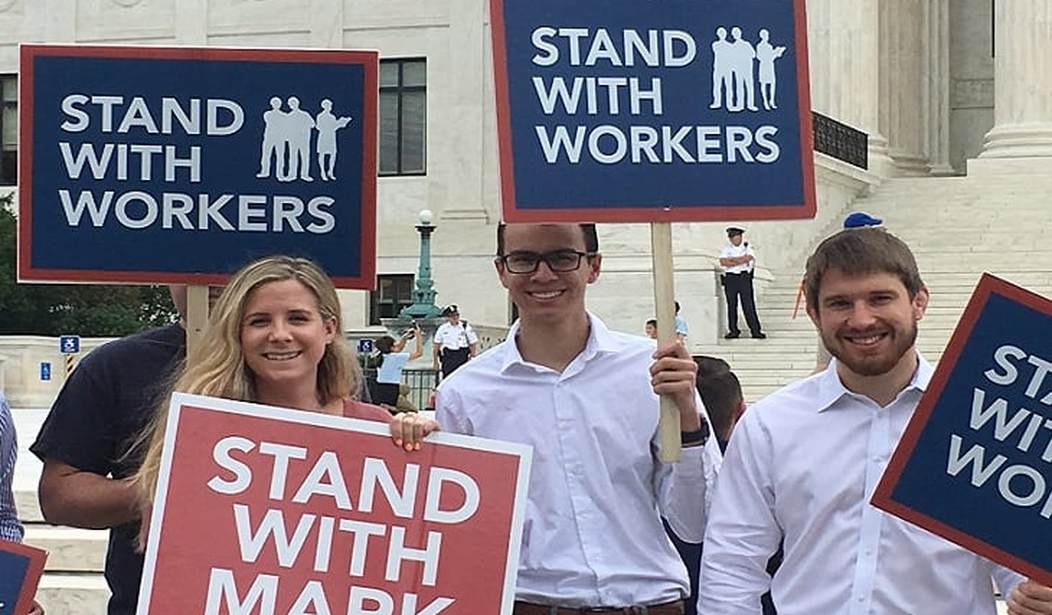The opinions expressed in guest op-eds are those of the writer and do not necessarily represent the views of RedState.com.
In its continuing quest to make government employee unions comply with the U.S. Constitution, the Freedom Foundation filed four appeals with the Supreme Court this session. The justices so far have declined to consider two, but in Kurk v. Los Rios Classified Employees Association (LRCEA), et al, the court has advised the defendants to prepare a response –– a clear indication they’re at least considering taking the case.
All the appeals were filed on behalf of public employees whose First Amendment right to opt out of union membership and dues was being denied by their union and the state in which they were employed, but Kurk differs from the others in that it focuses on freedom of association rather than freedom of speech.
In 2018, the court issued its landmark ruling in Janus v. AFSCME, which affirmed that forcing government employees to join a labor union or merely support its activities with a so-called “agency fee” violated their freedoms of speech and association. When unions erected phony obstacles to prevent members from opting out, many sought out the Freedom Foundation, a nationally recognized policy organization specializing in public-sector union abuses, to fight back in court.
Usually, their lawsuits focused on the reality that unions negotiating with state and local government over taxpayer dollars are, by definition, engaged in political activity, and requiring workers to pay dues or fees as a condition of employment amounts to compelled political speech.
Until now, lower court rulings have largely rejected this reasoning and the Supreme Court has resisted the temptation to intervene.
Kurk, however, may be the first Janus-related case to make it to SCOTUS precisely because it takes a different tack.
Plaintiff Kristine Kurk works as a benefits technician for Los Rios Community College. In 1997, she agreed to permit the district to deduct dues from her paycheck on behalf of LRCEA by signing a “dues check-off form” that gave her only two options — full membership and dues of $13 per month or non-membership and a so-called “agency fee,” which also totaled $13 per month.
The form specified no restrictions on terminating union membership or withdrawing authorization to dues deductions.
But when she sought to leave the union in 2018 — only weeks after the Janus ruling was issued — LRCEA officials denied her request, citing her dues check-off form and a 2017 California law preventing public employees from leaving their union while the union’s collective bargaining agreement with the agency they work for is still in force.
In Kurk’s case, there are two problems with that reasoning:
- The dues-check-off form she signed in 1997 — which, again, placed no limits on her ability to opt out — is not an agreement to maintain union membership, nor is it an agreement with the union at all. It is, at most, her authorization to the College District for the method of dues deductions.
- She cannot be constrained by a California law passed after she joined the union and to which she is not a party.
Taken to its logical conclusion, the latter provision would allow a union to keep members in the fold in perpetuity simply by renegotiating their existing CBAs before they expire.
The Freedom Foundation’s appeal notes:
“If a public employer and union, pursuant to state statute, can enter a contract to restrict free association rights by preventing union members from ever resigning membership, then millions of public employees across the country cease to have a meaningful right to freedom of association.”
Kurk and the Freedom Foundation filed suit in 2019 but a district court judge granted the state’s motion for a summary judgment. The 9th Circuit Court of Appeals in August 2022 upheld the lower court’s ruling, asserting that her “continued union membership and the deduction of union membership dues arose from the private membership agreement between the union and Kurk” and that it did not trigger any “constitutional scrutiny” at all.
“A state statute and CBA, not a private agreement between employee and union, compelled Kurk to maintain union membership and pay dues over her objection,” the appeal countered. “First Amendment protections against coerced association are undoubtedly triggered when the state grants its coercive powers to a private union to control union members’ relationship with their union. Denying public employees associational rights under the Constitution simply because they were once union members has no basis in precedent and no foundation in logic.”
Unions have been thumbing their noses at Janus since the ruling was issued five years ago. Kurk gives the court a great opportunity to start enforcing its handiwork, and it sounds like the justices know it.
Jeff Rhodes is the vice president of news and information at the Freedom Foundation. www.FreedomFoundation.com













Join the conversation as a VIP Member